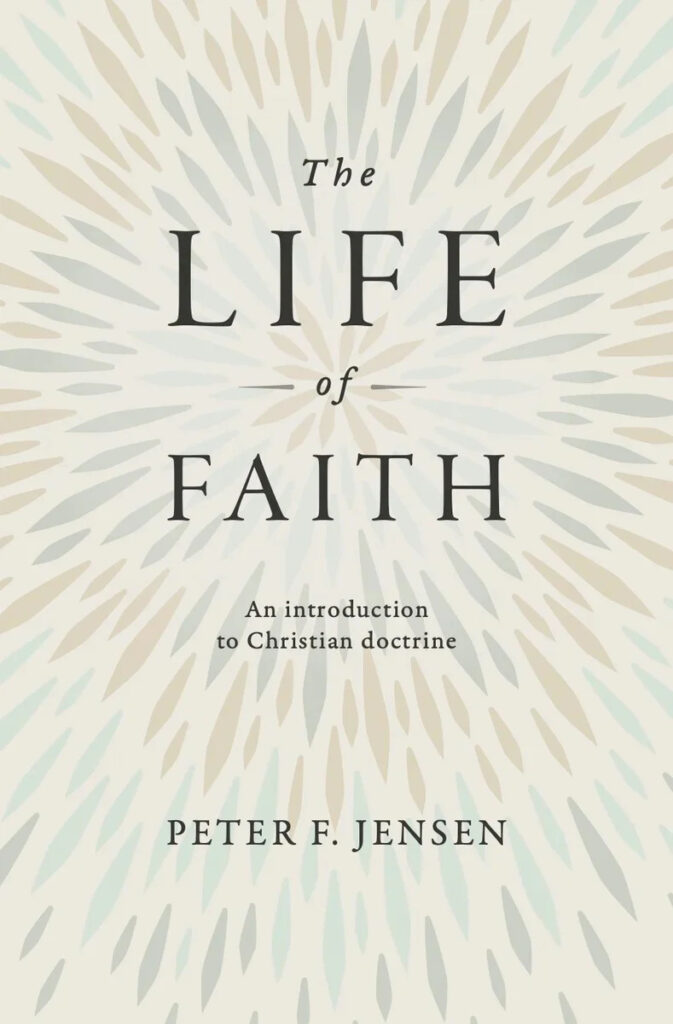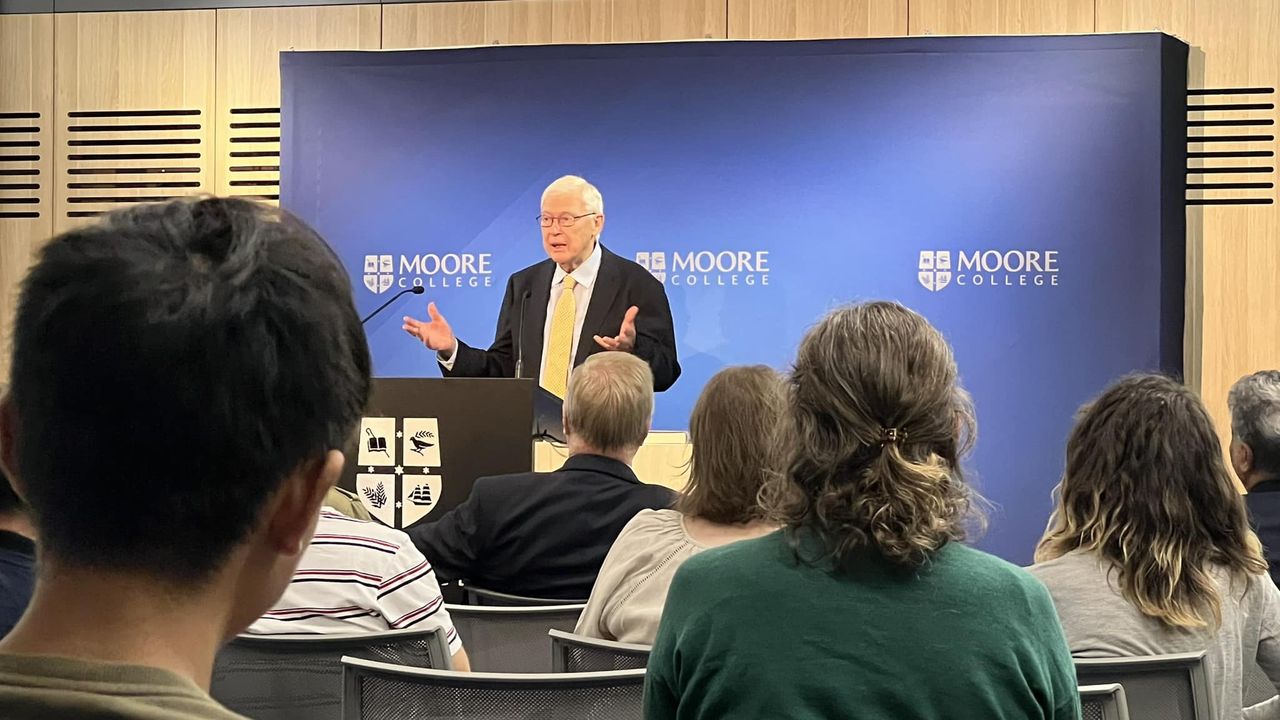Peter Jensen did not just teach his students what to think but how to think. That’s the description given by Mark Thompson, the current Principal of Sydney’s Moore College. How Jensen produced a generation of thinkers has become a book, The Life of Faith, launched last night by Matthias Media.
Moore College has a great tradition of “Doctrine One”, being the “Principal’s course”; it’s regarded as that important. Jensen calls it “the great overview course … giving you a Christian worldview .which enables you to understand the parts [of the rest of your course.”
That’s a big makes a big claim for a course. And by implication, of the book too. But a line-up of speakers at the launch declared that it was so. That god is knowable, that he makes himself known, is the launching point for the book – and if convinced of that, as this writer was, a whole world opens up. It is a liberation.
Three students of Jensen testified – it was at least as much a testimony meeting as a book launch. Mark Thompson, who compered the night began by thanking Jensen for forming him; “without us even knowing it, he was shaping us into young theologians.”
“Dr Jensen was never one to stand up front and boringly read out his notes,” said Carmelina Read, now Dean of Women at Christ College, the Presbyterian seminary in Sydney.
“We students were in awe that in true Socratic style, he led every lecture without referring zealous to any notes. He just bounced off the Bible and interacted with students. Even though our classes had over a hundred students. Dr Jensen used all sorts of methods to foster dialogue and reflective learning. For example, early on, he asked our class to write out the ten commandments without referencing our Bibles. We then had to mark our answers. It didn’t go well.
“But it quickly developed humility in a bunch of zealous first years and exposed our desperate need for theological education. But he did more than that. This was the start of Dr Jensen teaching us that the Old Testament is just as inspired and just as relevant as the New Testament; as he says in his chapters on knowing the God who speaks, you do not properly understand Jesus, God, or yourself without the Old Testament. For me personally, realising I couldn’t remember all of the 10 Commandments wasn’t the only lesson in humility that Dr Jensen taught me.”
As a still-young Christian, Kanishka Raffel, the Archbishop of Sydney, found doctrine one transforming.
“When I became a student at this college, I had been a Christian for six years. I did not grow up in a Christian family. I had not grown up going to church. .. I was well discipled ed by my local church and my pastor. But I was still a very young Christian.” So he valued “the clarity of Peter’s classes in doctrine But if anything, I value it even more now. Why? Because the obfuscation of the truth and beauty and power of the gospel, wittingly or unwittingly, is such a temptation to contemporary theologians and such an obstacle to disciples who seek in their reading of Christian books to grow in love and wonder and service of God and not merely in their vocabulary.”.
“For a relatively new Christian and the most unlikely first student, I revelled in the clarity of Peter’s presentation of the knowledge of God in his words and supremely in the gospel of his son; Peter achieved this sparkling exposition of the truth of scripture as an expression of both deep understanding and intellectual humility.”
Describing Doctrine One and The Life of Faith, Peter Jensen described them as “An Introduction in a way that will shape your mind, that you will never be the same again. It’ll inspire your worship for the whole of the rest of your life.”
Jensen also said what the book is not.
“The aim is, in this book, at least, to avoid textbooks. I’ve lots of systematic theology textbooks on my bookshelf, and I am very grateful for them. …You couldn’t possibly think about people sitting down and reading all the way through, but they’re very good for consulting on different subjects, like a dictionary.
And, describing the audience to be not only students but leaders in churches and old preachers looking for fresh ideas, he said what the book is. “I’m aiming here to do what the first year does, to provide the overview, and to do so in a way that is almost more a narrative, perhaps…
“[The aim] is to show the interconnectedness of doctrine, how it all fits together. If that’s accompanied with clarity, I would be only too pleased.
“It points beyond itself to others. That is to say; it is only introductory. It’s intended to say there is a vast tradition of Christian authorship in 2000 years. We are the heirs of treasures untold. And this book is meant to launch you into that search, that lifelong search.”
Image: Peter Jensen at the Life of Faith launch. Credit; Nick Shelley

The Life Of Faith: An introduction to Christian Doctrine Peter Jensen, Matthias Media 2023 $34.99 is available from The Wandering Bookseller


I have ordered this and look forward to reading it. I was sorry I could not attend the book launch itself. One thing I am looking forward to seeing in the book is this: does it start with the premise, the assertion, that the Bible is the word of God, reliable, complete, sufficient, and then build from there? Or does it given a reason to accept this premise, this assertion, first, before moving on to the doctrines it teaches? Can’t wait to find out! 🙂
Does the Bible call itself the word of God? I’ve looked for years but can’t find it.
Tody, This is a bit like asking if the Bible says that God is a “Trinity”. We need to ask, rather, whether the bible describes God as three distinct persons sharing one essence or not, that being a classical definition of Trinity. Similarly, with the “word of God” sobriquet, we need to ask whether the bible’s self-description matches that concept or not.
Hi John – lovely to hear from you, I appreciate your work and heart more than I can possibly say.
I don’t think your trinity comparison is apposite. The bible has countless opportunities to call itself the word of God but it never does. ‘Law and Prophets’, ‘scriptures’ etc are what it chooses. In God’s economy it took centuries for the church to grapple with and settle on ‘trinity’ for God’s self disclosure. I t was not clear at the time and God did not intend it to be so.
In your writing I often detect disturbance, even anguish, over evangelical Xn attitudes and behaviours. I share this distress. I think a key driver of this ungodly arrogance/rigidity is the false view of the Bible as ‘the word of God’. Unqualified, the Bible reserves this title for Jesus. More often ‘word of God’ is applied in a dynamic, immediate, contextual sense or simply to the gospel or to the activity of God in his creation etc. The Bible’s self-description is fundamentally different to ‘the word of God’. The Bible uniquely and authoritatively records the words of God revealed to his people at their time.
My concern is not idle or pedantic. Xns desperately need to discover the Jesus and message of the bible and not read it thru unbiblical presuppositions. The ‘Because we have the word of God (ie Genesis1:1 – Revelation 22:21) we have the truth sewn up’ attitude is profoundly damaging.
“The Bible uniquely and authoritatively records the words of God revealed to his people at their time.” It is problematic if we allow ourselves to judge the Bible from our place in history. It can be a sort of historical progressivism if we take it too far.
“The ‘Because we have the word of God (ie Genesis1:1 – Revelation 22:21) we have the truth sewn up’ attitude is profoundly damaging.” A true evangelical is always open to being persuaded they have read the Bible wrongly. In that sense, it is extremely unwise to think we have the truth sewn up. But the discussion must reference scripture.